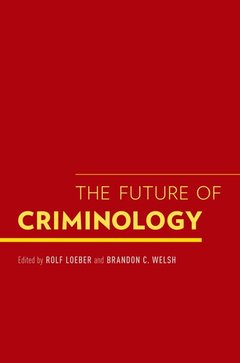The Future of Criminology
Langue : Anglais
Coordonnateurs : Loeber Rolf, Welsh Brandon C.

Criminology is a dynamic and evolving field of study. In the recent decades, the study of the causes, development, prevention, and treatment of juvenile delinquency and adult crime has produced many important discoveries. This volume address two questions about crucial topics facing criminology - from causation to prevention to public policy: Where are we now? What does the future hold? Rolf Loeber and Brandon C. Welsh lead a team of more than forty top scholars from across the world to present the future of research, policy, and practice in the discipline. "Criminology has entered into a new era in which standard ideas are being revised or replaced by fresh theoretical and empirical investigations. In The Future of Criminology, Rolf Loeber and Brandon Welsh capture the field's dynamic nature by pulling together, under one cover, diverse ideas of where criminology should head. Written by leading scholars, the volume's contributions provide lucid and compelling assessments of how best to think about crime and its control. Every scholar should keep this book close at hand and consult it regularly."--Francis T. Cullen, Distinguished Research Professor, University of Cincinnati "Inspired by David Farrington, one of the world's foremost scholars of criminology, The Future of Criminology is designed to be a 'state of the art' collection of essays delineating criminology's contribution to our understanding of crime prevention and its control. It succeeds admirably as a diverse group of leading scholars summarize, integrate, and extend previous work on child delinquency, criminal careers, psychopathology, high-risk families and communities, and experimental criminology. Researchers, policymakers, and students will benefit greatly from a close study of its chapters." -- Joan Petersilia, Adelbert H. Sweet Professor of Law, Stanford Law School "This set of contributions, by forty world-renowned criminologists, constitutes a cutting-edge volume for future generations of scholars to take the baton from David Farrington."--Gerben Bruinsma, Director of Netherlands Institute for the Study of Crime and Law Enforcement, Amsterdam
Contents. Foreword: Looking Back and Forward. David P. Farrington. A Future of Criminology and a Criminologist for the Ages. Rolf Loeber and Brandon C. Welsh. Contributors. I. DEVELOPMENT AND CAUSATION. 1. Some Future Trajectories for Life Course Criminology. D. Wayne Osgood. 2. Does the Study of the Age-Crime Curve have a Future?. Rolf Loeber. 3. Developmental Origins of Aggression: From Social Learning to Epigenetics. Richard E. Tremblay. 4. Biology of Crime: Past, Present, and Future Perspectives. Adrian Raine and Jill Portnoy. 5. Self-Control, Then and Now. Terrie E. Moffitt. 6. Criminological Theory: Past Achievements and Future Challenges. Terence P. Thornberry. 7. Individuals' Situational Criminal Actions: Current Knowledge and Tomorrow's Prospects. Per-Olof H. Wikstrom. 8. Lack of Empathy and Offending: Implications for Tomorrow's Research and Practice. Darrick Jolliffe and Joseph Murray. 9. Person-in-Context: Insights and Issues in Research on Neighborhoods and Crime. Gregory M. Zimmerman and Steven F. Messner. 10. Risk and Protective Factors in the Assessment of School Bullies and Victims. Maria M. Ttofi and Peter K. Smith. 11. Adult Onset Offending: Perspectives for Future Research. Georgia Zara. 12. The Next Generation of Longitudinal Studies. Magda Stouthamer-Loeber. II. CRIMINAL CAREERS AND JUSTICE. 13. Research on Criminal Careers: Part 1: Contributions, Opportunities, and Needs. Alfred Blumstein. 14. Research on Criminal Careers: Part 2: Looking Back to Predict Ahead. Alex R. Piquero. 15. The Harvesting of Administrative Records: New Problems, Great Potential. Howard N. Snyder. 16. Twenty-Five Years of Developmental Criminology: What We Know, What We Need to Know. Marc Le Blanc. 17. Pushing Back the Frontiers of Knowledge on Desistance from Crime. Lila Kazemian. 18. Does Psychopathology Appear Fully Only in Adulthood?. Raymond R. Corrado. III. PREVENTION. 19. Preventing Delinquency by Putting Families First. Brandon C. Welsh. 20. The Future of Preventive Public Health: Implications of Brain Violence Research. Frederick P. Rivara. 21. alt,"Own the Place, Own the Crimeagt," Prevention: How Evidence about Place-Based Crime Shifts the Burden of Prevention. John E. Eck and Rob T. Guerette. 22. Community Approaches to Preventing Crime and Violence: The Challenge of Building Prevention Capacity. Ross Homel and Tara Renae McGee. 23. Taking Effective Crime Prevention to Scale: From School-Based Programs to Community-Wide Prevention Systems. J. David Hawkins, Richard F. Catalano, Karl G. Hill, and Rick Kosterman. IV. INTERVENTION AND TREATMENT. 24. The Human Experiment in Treatment: A Means to the End of Offender Recidivism. Doris Layton MacKenzie and Gaylene Styve Armstrong. 25. Towards a Third Phase of 'What Works' in Offender Rehabilitation. Friedrich Losel. 26. Raising the Bar: Transforming Knowledge to Practice for Children in Conflict with the Law. Leena K. Augimeri and Christopher J. Koegl. 27. Intervening with Violence: Priorities for Reform from a Public Health Perspective. Jonathan P. Shepherd. 28. How to Reduce the Global Homicide Rate to 2 per 100,000 by 2060. Manuel Eisner and Amy Nivette. V. PUBLIC POLICY STRATEGIES. 29. The Problem with
Rolf Loeber is Distinguished University Professor of Psychiatry and Professor of Psychology and Epidemiology at the University of Pittsburgh, Pittsburgh, Pennsylvania, U.S.A., and Professor of Juvenile Delinquency and Social Development, Free University, Amsterdam, Netherlands. He is Co-director of the Life History Program. Brandon C. Welsh is an Associate Professor in the School of Criminology and Criminal Justice at Northeastern University and a Senior Research Fellow at the Netherlands Institute for the Study of Crime and Law Enforcement. He has written nine books, including The Oxford Handbook of Crime Prevention (Oxford University Press, in press).
Date de parution : 06-2012
Ouvrage de 336 p.
23.1x15.5 cm
Date de parution : 08-2012
Ouvrage de 336 p.
23.9x16 cm
Thème de The Future of Criminology :
© 2024 LAVOISIER S.A.S.



